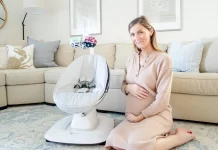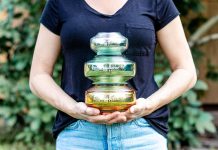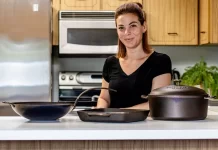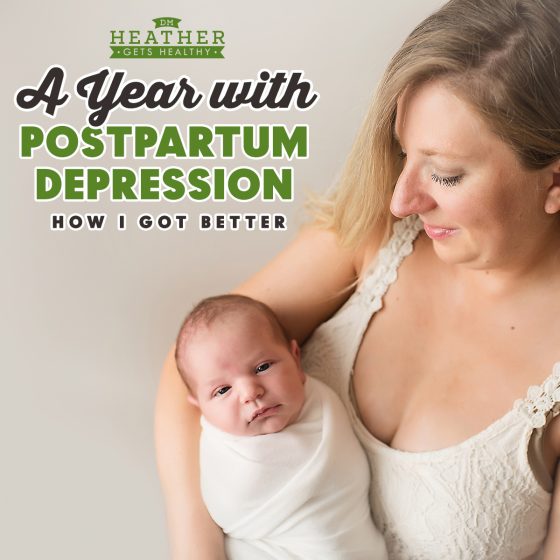My journey with postpartum depression has been long, surprising, and transforming. You can read more about my story in parts 1, 2, and 3. I was diagnosed with PPD in December 2016, though over the past year, I’ve learned I was suffering with antepartum and postpartum depression, and postpartum anxiety, for years. I am constantly getting messages from moms who have had similar experiences, but aren’t sure where to turn or what to do – so they ask me about what got me through it all. I want to share everything that I have done to help recover and climb out of my depression and anxiety – and of course, I must note first that I am not a doctor or medical professional. I am simply a mom, who does insane amounts of research, and tries to be proactive with my health, sharing what has worked for me. Always be sure to talk to your doctor and do your own research before trying something new.
Unfortunately, there is an insane amount of stigma on mental health – especially postpartum depression. The majority of our knowledge of postpartum mood disorders comes from extreme stories in the media, of mothers with postpartum psychosis (far more rare and far more serious than PPD/A) who harm themselves and/or their children. So many moms fear getting help for their mental health issues, because they are worried their children will be taken away – which is not actually the case.
Getting help is hands down the very best thing you can do. The changes that have happened for me – and my entire family – are immeasurable – and all came from me getting help. I was deeply embarrassed and felt so much guilt, but I also knew that I somehow had to get over that and just push through the process. This is what I have done over the past year.
Talk About It
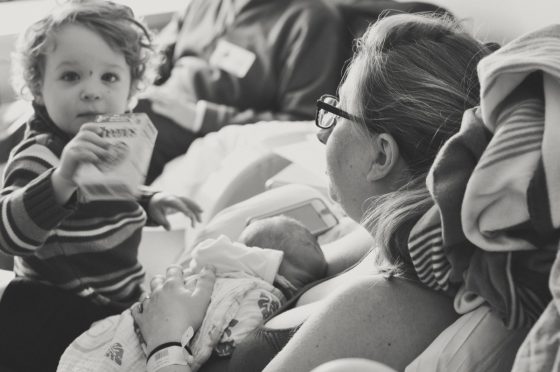
Postpartum mood disorders are incredibly isolating. You simultaneously feel peak levels of embarrassment and like the worst mother ever – but, you are not alone. Two of the scariest things I’ve done to get through postpartum depression and anxiety is going to support groups and counseling. When I left the partial hospital program last January, I was terrified I would regress and lose the progress I had made. I also strongly felt I needed to stay in the program longer, but couldn’t afford it with our high-deductible insurance plan. So, I was adamant that I have a rock-solid after-care plan. The hospital program helped me find two different postpartum support groups, and my initial plan was to attend both a few times and pick the one I liked best – because isn’t two support groups overkill? Over a year later, I’m still attending both. They are both unique, I love my experiences there, and I don’t want to pick one. Plus, if I miss one due to a scheduling conflict, I know that I always have the other group on the calendar.
Walking into a support group for the first few times is scary and intimidating. When I arrived at my first group, I sat in the parking lot, too scared to go in. Eventually, I forced myself out of the car and into the group, and I’m so, so, so glad I did. I think I just sat silently and cried – an overwhelm of emotions – at my first few groups, but eventually, I was comfortable enough to begin sharing, and that simple change has made a world of difference.
Counseling is another scary one – you’re talking with a stranger about issues that are upsetting, embarrassing or make you squeamish. But again – so. worth. it. I firmly believe that every person in the world should be in counseling, regardless of mental health status or diagnosis. You don’t need to have postpartum depression to benefit from counseling. Guys – life is hard. We all face challenges and struggles, and it’s such an incredible source of help and relief to be able to vent and discuss with someone who is objective. I will also say if you find a counselor and don’t mesh with him or her after a few sessions, find someone new. You won’t click with everyone, and it’s so important to find someone who you like.
My Supplement Army
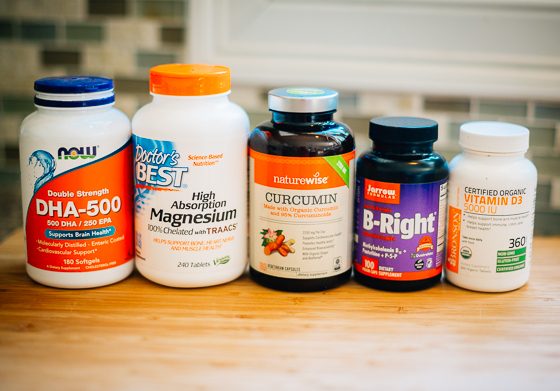
I started on what I call a “micro-dose” of Zoloft when my doctor first diagnosed me with postpartum depression and anxiety. I’ve eventually worked up to the full dose, and have added in my famous “supplement army” to help as well. Years ago, my naive self said that if I ever had depression, I would cure it with nutrition, fitness, and supplements. I have 100% gotten so much better with those three components, but I also would not be where I am now without medication. I have a severe distrust of doctors and big pharma and putting drugs into my body, but guess what? I need it. Just like a diabetic needs insulin, or someone with high cholesterol needs statins. For some reason, there’s a lot of shame around needing medication for mental health – but it’s a disease just like any other disease – and sometimes, you just need the medication. Ain’t nothing wrong with that.
On top of the Zoloft (and prenatal vitamins to help my migraines, and collagen because I’m getting old AF), I take:
- Magnesium glycinate – people with anxiety and depression often have low magnesium levels, so I take 400mg in the morning and in the evening. I also suffer from migraines, which also are linked to low magnesium, so this packs a huge punch for me.
- B complex – low levels of B vitamins are also linked to depression and anxiety.
- Turmeric – turmeric can reduce symptoms of depression and anxiety, and as a bonus, can help you sleep better as well.
- Vitamin D – I started taking 5,000 IU when I was breastfeeding my middle child (I wanted to avoid giving her those gross, sugary D drops, and our pediatrician said if I take that much vitamin D, her dose will come out in my breastmilk, so she and I both would get the benefits), and I’ve never stopped. Low vitamin D levels are also linked to depression.
- DHA – DHA is an important supplement during pregnancy, for fetal brain development – but it’s also super important for postpartum depression as well. It is believed that mothers are depleted of DHA during pregnancy and breastfeeding, leaving them susceptible to PPD, so taking DHA proactively can help.
Let There Be Light

I live in New England, and let’s just say, winters are freaking rough. All the vitamin D pills in the world can’t help me 100% through the winter season (and if we’re really being honest, which we are, springtime is even worse because there’s no pretty snow, everything is brown and gray, and I desperately want it to be warm and sunny – aaaaand it’s cold and rainy). I have been fascinated by the idea of light therapy for years, but never put the effort into trying it, until recently.
I discussed it with my doctor, and she felt strongly that light therapy could help my depression symptoms in the winter, as I have always had some degree of seasonal depression. She wrote me a prescription for it (who knew, you can get prescriptions for things that aren’t pills?!), and I brought that to a local medical device store. The store worked with my health insurance and handled all the paperwork on the back end. Within a week or two, I was the proud new owner of this glorious beast. Ain’t she pretty?
The store carried the Carex Daylight Classic Plus (shown above), and after doing some research and reading the many positive reviews, I went with it. I knew it was important to get a light that was 10,000 LUX (which is the “SI unit of illuminance and luminous emittance, measuring luminous flux per unit area. It is equal to one lumen per square metre. In photometry, this is used as a measure of the intensity, as perceived by the human eye, of light that hits or passes through a surface,” thank you, Wikipedia) to get the full benefits of light therapy. I also read that it was important for the light to shine down on you, as opposed to up, or across, and this was also another feature of this particular light therapy lamp.
Essentially, these special lamps (not to be confused with a regular table lamp – these are actual medical devices that shine special kinds of light – and no, you will not get a tan from these!) meant to mimic the psychological benefits you get from the sun. These lamps do not provide vitamin D (which is why continuing your supplement is important, even when doing light therapy). It’s thought that light therapy helps your brain produce more seratonin, which can have a positive impact on depression symptoms – as well as increase melatonin production at night, which helps you sleep better. Better sleep = happier you.
Be sure to note that the dose should be reached gradually. My doctor recommended I start with 5 minutes a day, and gradually work up to 30 minutes a day. I thought, “Screw this, I feel awful, I’m going for it with gusto,” and tried 20 minutes my first day, and 30 minutes the day after that. Well wouldn’t you know, you can overdose on this. Crazy, right? I was actually worse – irritable, anxious, and jittery. So, I went back and re-started with 5 minutes a day for a few days, then 10 minutes, until I hit my goal of 30 minutes.
Try All The Things
My husband calls me “the most proactive person with postpartum depression, ever,” because I have really tried as much as humanly possible this past year. Nutrition, exercise, supplements, medication, therapy, support groups, self-care, accepting help, adult coloring books, essential oils, Epsom salt baths, getting more sleep. You name it, and it’s in my toolbox. Some things work better than others, some things I barely have time for (see: adult coloring books and getting more sleep), but others I make a top priority each day (see: fitness, nutrition, and everything else in this post).
Try my tips here. Try other tips you come across. Try whatever strikes your fancy. Try. It. All. Figure out what works best for you. It’s different for all of us, but by trying everything, you’ll have a sense of empowerment as you battle a disease that often makes you feel powerless.
